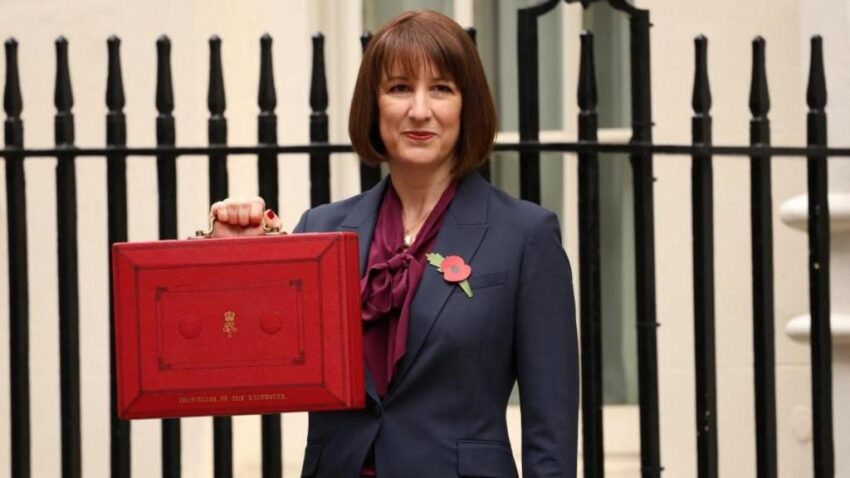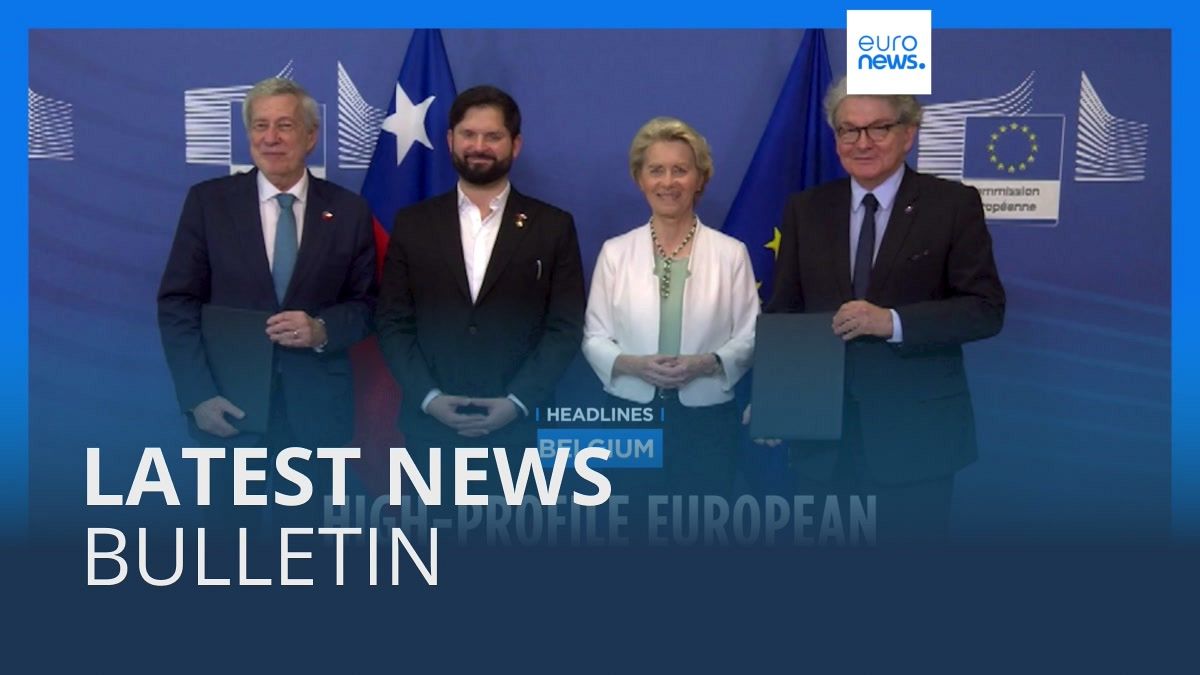‘Hope went out like a candle’ — EU official Johan Floderus survived years in an Iranian jail
Reunited with his partner and ready to return to work, the 34-year-old Swede speaks to POLITICO.
‘Hope went out like a candle’
EU official Johan Floderus survived years in an Iranian jail. Reunited with his partner and ready to return to work, the 34-year-old Swede speaks to POLITICO.

By EDDY WAX
in Brussels
Photo-illustration by Blake Cale for POLITICO
When Johan Floderus was arrested in Iran in April 2022, the authorities confiscated his Lonely Planet guide, a copy of the New Yorker and a book of Sufi poetry before putting him in solitary confinement.
With little else to do in his 130 square foot cell, Floderus spent the first two months of his detention walking in circles for six hours a day and another two making up grueling exercise circuits for himself based on CrossFit classes he had taken back home in Europe.
Depleted of energy, the 34-year-old European Commission civil servant would try to forget where he was, held with hundreds of prisoners and dissidents in the Iranian capital, in its notorious Evin jail.
“When I was completely exhausted, I would just lie down and kind of pant, and I would put a wet towel on my face, close my eyes and just escape mentally,” Floderus said in an interview revealing harrowing new details of his over two-year imprisonment. “I would spend an hour just being somewhere else. It was the best time of day.”
Iran has employed the strategy of hostage diplomacy since the 1979 Islamic revolution, when it held more than 50 hostages from the American Embassy in Tehran for more than 400 days while demanding the shah of Iran’s return from the United States. When Floderus emerged from solitary confinement, his fellow prisoners revealed to him why he had been detained.
“When I told the other prisoners there about what happened to me, they immediately told me: ‘Oh, but you’re a hostage. Have you never heard about this guy called Hamid Nouri in Sweden?’”
Floderus, a Swedish national, was arrested and charged with espionage during a trip to see friends in Tehran. He suddenly found his fate intertwined with that of Nouri, an Iranian judiciary official. The Iranian was detained in Sweden while on vacation and sentenced to life in prison for the mass execution of Iranian political prisoners in the 1980s.
Floderus was facing a possible death sentence, according to Swedish Prime Minister Ulf Kristersson.
“If it wasn’t me, it would have been another Swedish citizen put in my place,” Floderus said.
‘Between hope and despair’
Floderus drew succor from his anthology of Sufi poetry — once prison guards returned it to him months into his detention.
“It’s all about finding meaning or even joy in one’s suffering,” he said.
For the first stretch of his imprisonment, Floderus was convinced there had been some sort of mix up and he would be back on the next plane to Brussels. Soon he found out that his previous travel to Iran as an EU official for projects related to Afghan refugees were classified as spying by his interrogators.

“It all [supposedly] showed that my real intention — the EU’s real intention and my intention — was to topple the establishment,” he said.
His hope of being released faded.
“Days and days and days started passing without any news, without any human contact,” he said. “I saw myself as spending sort of an indefinite period of time [there], five, ten, fifteen, twenty years, who knows? Hope just went out like a candle.”
Allowed only three twenty-minute stints outside each week, Floderus organized his life in his cell. When out of solitary confinement (Floderus spent a total of eight months alone), he became the undisputed boss of his cell. Fluent in Farsi, he set co-living rules to keep the cramped space clean, taught English and fashioned chess sets and playing cards out of cardboard. He filled his time by making decks of cards, playing poker sometimes (“That’s super illegal, according to Islamic law,” he added.) On Iranian State TV, Floderus watched the film Papillon about a wrongfully convicted man who escapes his imprisonment.
For two weeks he shared his cell with the Belgian aid worker Olivier Vandecasteele until they were split up into separate cells for reasons unknown to Floderus.
“I think I spent months, half a year maybe more, between hope and despair, sort of as a pendulum,” he said. “I just tried to break out of that really destructive and horrible pattern and tried to reach a place of just acceptance, some people call it radical acceptance, acceptance of the here and now.”

After ten months, prison officials allowed him to make a three-minute call to his partner of four years — now fiancé — Johnathan von Fürstenmühl, 31. Despite their inability to speak regularly or for more than a handful of minutes, a similar realization was also dawning on von Fürstenmühl back in Brussels, who was reading about other cases of Swedish nationals held hostage abroad.
Iranian officials who arrested Floderus knew he had a boyfriend because they had looked through his phone, Floderus said. Still, the Swede — whose hundreds of cellmates included dissidents, killers and members of Islamist terror group, ISIS — kept his sexuality secret.
Freedom Party
The only point of regular contact with the outside world Floderus had was with a consul from the Swedish embassy. Once, that person passed on a copy of Leo Tolstoy’s War and Peace via Floderus’ interrogator.
He read it three times.
“It was thanks to Tolstoy that I can look at what’s going on, what’s happening to me, in a different light. I don’t have to look at it as just bad. I can think of it as a challenge to be overcome and as an opportunity to grow,” he said.
In Brussels, with no contact from his partner for months, von Fürstenmühl chafed against a request from the Swedish government not to go public about Floderus’ detention. Silent diplomacy had its limits, he told Swedish ministers and Johan’s family in Sweden on more than half a dozen trips to Stockholm.
It pained von Fürstenmühl to tell friends who inquired about Johan’s mysterious disappearance that he was merely back home in Sweden dealing with a “family emergency.”
Then — after more than 500 days of imprisonment — the New York Times broke the story about his imprisonment in September 2023.
“It gave me a lot of strength,” said Floderus, describing seeing his face appear on Iranian state TV in his cell.
The public campaign led by von Fürstenmühl exploded into life, with posters going up around Brussels and international coverage, including by POLITICO.
Then one day in mid-June, von Fürstenmühl’s phone rang. The call was from a Swedish government official who told him to get on the next flight to Stockholm to meet Floderus.
The experience has changed Floderus, who is now a more spiritual person, by his own account.

He was released in exchange for Nouri in a prisoner swap brokered by the Swedish government in June. Dual Iranian-Swedish citizen Saeed Azizi, who Sweden described as having been arrested on “equally false grounds,” was also released under the deal.
Since his return to Brussels, Flordus has held a joyous “freedom party” for friends from around the world, cut alcohol from his diet and limited the amount of news and social media he consumes.
He will return to work at the European Commission’s department for development in January, after six months of medical leave, in which he has received mental health counseling.
“My head was not connected to my body,” von Fürstenmühl said, recalling the anxious wait at a Swedish airport, with Johan’s parents and two older sisters.
Then Floderus was on one knee on the airport tarmac proposing to him.
“I’m the happiest man alive,” Floderus says, voice cracking.
What's Your Reaction?
















































